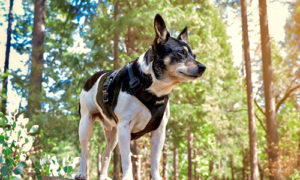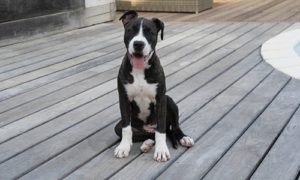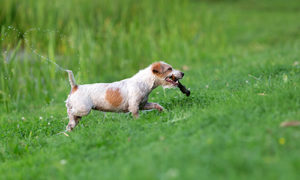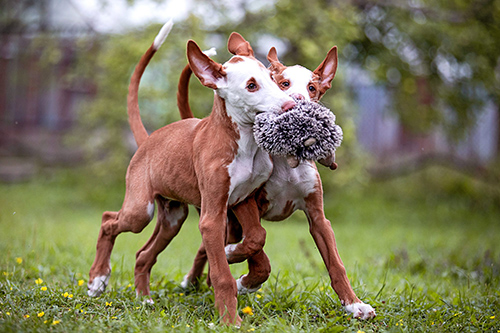
The Ibizan Hound was primarily used for hunting rabbits on the Island of Ibiza. Sighthounds with prick-ears are believed to have been widespread in ancient Egypt. However, breed historians can only contemplate a potential connection between dogs of Northern Africa and the Balearic Islands. Today, the breed remains true to its original purpose in Spain. The Ibizan Hound was first brought to America in 1956 and has never become a famous companion dog.
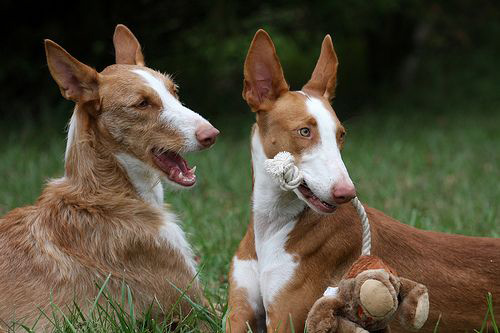
Breed Standard
The Ibizan Hound is an elegant, athletic dog noted for its graceful outline, light pigment and eye color, and large ears that are pointed. It has a long, narrow head; a flat skull; a long, tapered muzzle with a slightly Roman profile, and a light, flesh-colored nose. The dog’s small eyes range in color from amber to caramel. The Ibizan is built moderately, with a slender, long, arched neck; a level back; long, light-boned legs; and oval-shaped hare feet. The breed’s low-set tail reaches the hock and is carried in the sickle, ring, or saber position.
Breed Facts
| Energy level | Watchdog ability | ||
| Exercise requirements | Protection ability | ||
| Playfulness | Grooming requirements | ||
| Affection level | Cold tolerance | ||
| Friendliness toward dogs | Heat tolerance | ||
| Friendliness toward other pets | Friendliness toward strangers | ||
| Ease of training |
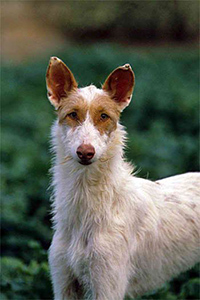
Activity level: Moderate to high. Ibizan Hounds are robust and resilient hunting dogs bred to track fast game over challenging terrain. Ibizans possess the unequaled jumping ability and can quickly clear a five-foot fence. These dogs are noted for their trainability and versatility; they can be superior in obedience, lure coursing, tracking, and open field coursing. Ibizan Hound puppies are slow to mature, and owners should closely supervise adolescents.
Grooming: This breed requires weekly brushing for both coat types, along with occasional bathing and ear cleaning.
Coat: The dogs have two coat types, which are short and wire. The short coat is hard, short, and flat, and the wirehaired coat is hard, wiry, and 1 to 3 inches in length.
Color: White, red, or any combination of the two.
Group: Hound
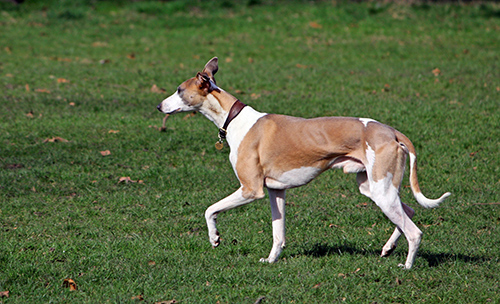
Year recognized by the AKC: 1978
- Popularity: very rare
- Family group: sighthound
- Country of Origin: Ibiza (Balearic Islands)
- Date developed: ancient times
- Original purpose: hunting rabbits
- Today’s purpose: lure coursing, hunting rabbits
- Other names: Podenco Ibicenco, Ca Eivissenc, Balearic Dog
Ibizan Hound Temperament
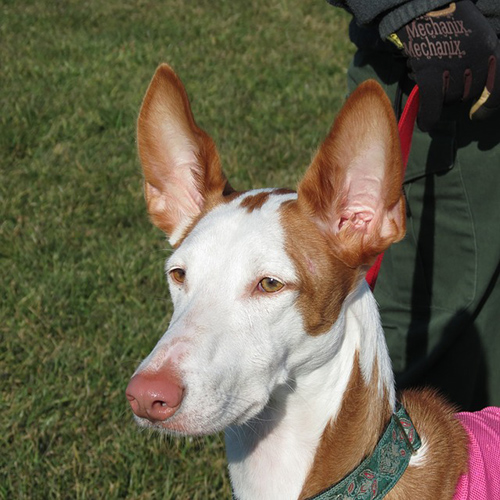
Ibizans are loyal, affectionate, and make excellent family companions. They possess a strong hunting instinct but can be trained to accept cats and other small pets. The dogs are quite vocal and make excellent watchdogs, as they are quick to sound an alarm. In general, the dogs are aloof with strangers. Ibizan Hounds are quick to learn, and their incredible problem-solving skills include a fantastic ability to open gates and cupboards. They are pretty sensitive and intolerant of harsh handling or punishment.
The Ibizan Hound is graceful, and it retains its hunting instinct, using its acute senses of smell and hearing to pinpoint small animals and delight in the prospect of chasing anything that moves. Contrasting many sighthounds, it barks while chasing. The dogs are reserved with strangers, and some can be timid. It is gentle, loyal, mild-mannered, and even-tempered, making for a quiet canine companion.
Health
- Main concerns: none
- Minor problems: seizures, allergies
- Rarely seen: deafness, cataract, axonal dystrophy, retinal dysplasia
- Recommended tests: eye, (hip), (BAER), (thyroid)
- Life span: 12 to 14 years
- Note: sensitive to barbiturate anesthesia
- Weight: male – 50 pounds; female – 45 pounds
- Height: male – 23.5 to 27.5 inches; female – 22.5 to 26 inches
Breeder and Buyer’s Advice

Find a reputable breeder. Ask about the puppy’s pedigree, hereditary problems, and any health testing done on the parents. You can find a list of breeders in your area on the parent’s club website. Contact the breeders and inquire about puppies for sale and price information.
Parent club: Ibizan Hound Club of the United States (https://ihcus.org/); founded in 1975
Rescue: Information on IHCUS Rescue can be found on the parent club’s website.


